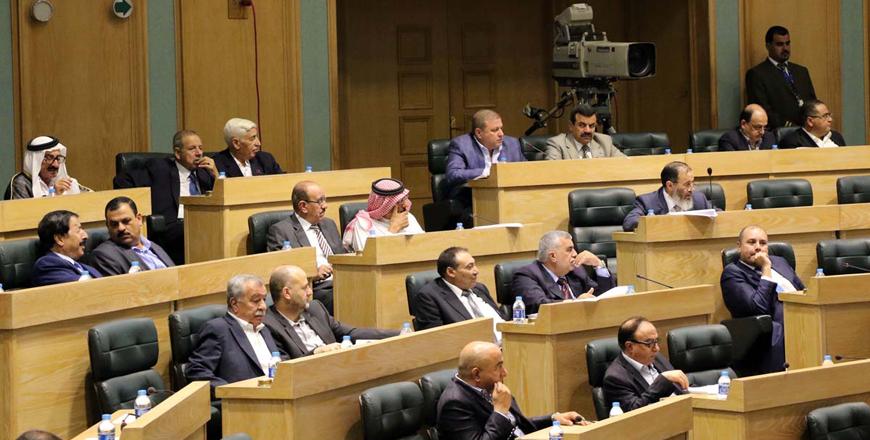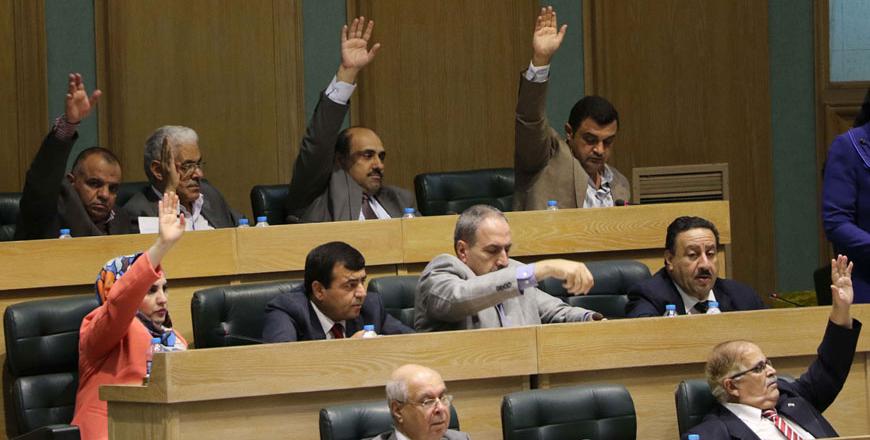You are here
Deputies continue deliberations over municipalities bill
By Petra - Aug 09,2015 - Last updated at Aug 09,2015

Deputies attend a Lower House session on Sunday (Petra photo)
AMMAN — The Lower House resumed its deliberations of the draft municipalities law on Sunday, passing a provision that allows the government to postpone the municipal elections for no more than six months if that serves national interests.
Under MPs' amendments to the 2015 reform-oriented law, mayors and local council members will be elected every four years and, if a municipal council is dissolved less than one year before completing its term, the municipal affairs minister can appoint an ad hoc committee to run the municipality's affairs.
If the municipal council is dissolved more than one year before completing its four-year term, the ad hoc committee's mandate will be only for one year after which a new municipal council and local councils are elected for the remainder of the term, according to lawmakers' amendments.
During the session, Prime Minister Abdullah Ensour said the government will not dissolve municipal councils before the completion of their four-year term, noting that previous experiences in that regard were unsuccessful.
However, Ensour acknowledged that there are exceptional cases that require the dissolution of municipal councils if it serves national interests and ensures transparent polls.
As endorsed by an overwhelming majority of MPs, the bill stipulates that mayors will be the first and foremost leading officials who preside over staff and supervise the work of committees formed by municipal councils.
Mayors also sign contracts and agreements endorsed by the council and any memorandums of understanding and twinning agreements, provided that they are approved by the municipal affairs minister if they are signed abroad; while heads of local councils grant the licences required for road work to extend water and waste water networks.
The law also requires appointed executive directors at municipalities to be Jordanians with no criminal records in addition to holding a bachelor's degree in civil or architectural engineering or urban planning.
An executive director, who is appointed by the municipal affairs minister on an annual contract basis under a recommendation from the municipal council, is responsible for implementing a municipality's annual plan and the decisions of the council under the supervision of the mayor
The bill classifies municipalities into three categories: those at governorate centres or at any area with a population of over 100,000; those at district centres or any area with a population of over 15,000; and other municipalities.
In an evening session on Sunday, the 150-strong House endorsed a provision on merging or separating municipalities as worded by the government, rejecting the joint legal and administrative committee's decision to scrap it.
Under the article, an area can request separation from a municipality, provided that its population is over 10,000 and that the municipality has been in place since before 2001.
The area's revenues for the year before the separation petition is filed should be no less than JD1.5 million, to which 10 per cent is added for every year after the law goes into effect, according to the bill.
The separation petition should be filed to the administrative governor, who forwards it to the minister along with his notes.
The House also approved an article that stipulates having buildings within the Old City of Jerusalem subject to property tax.
Municipal Affairs Minister Walid Masri said the article is from the 1955 law, noting that the tax is not being collected, but the government kept the provision because it does not recognise the authority of the occupation.
Lawmakers also approved an article that prevents having the salaries of a municipality's employees exceed 50 per cent of its budget.
The ratio becomes 40 per cent five years after the law goes into effect.
Related Articles
AMMAN — The Lower House on Sunday passed the draft decentralisation law, granting eligible voters two votes each as they elect the governora
AMMAN — The Lower House on Sunday endorsed the draft municipalities law with amendments to the government's version of the bill.During an ev
AMMAN — The Cabinet on Tuesday decided to dissolve the Qriqra and Feynan Municipality council and form an ad hoc committee to run it until t


















